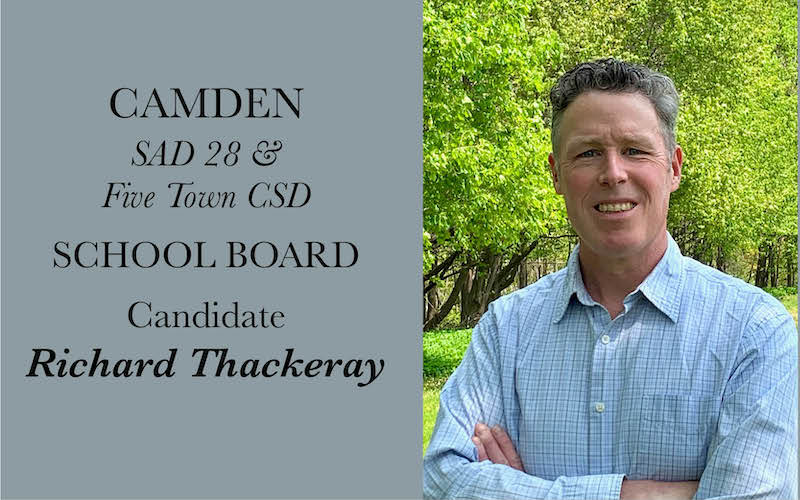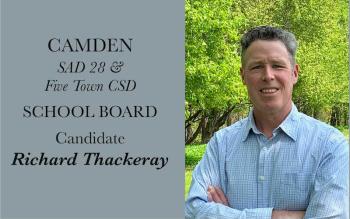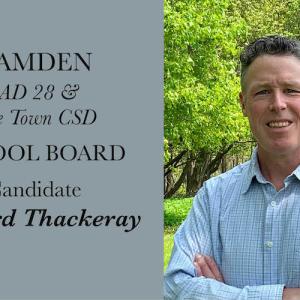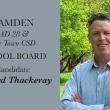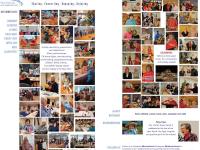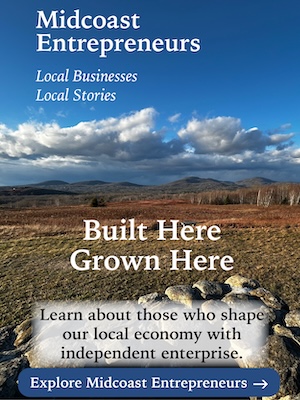On the issues: Camden School Board Candidate Richard Thackeray
On June 13, voters in Camden will elect two citizens from a slate of three to serve on the School Administrative District 28 (Camden-Rockport K-8) and the Five Town CSD (Camden Hills Regional High School) boards of directors. There are two open seats this June, both three-year terms.
Penobscot Bay Pilot has posed questions to each candidate — Marcus Mrowka, Jezabel (Sessa) Salas and Richard Thackeray — providing the opportunity for the public to better understand their position on issues important to education and the schools. Currently, Mrowka and Thackeray sit on the SAD 28 and Five Town CSD boards.
Here, Richard Thackeray discusses his position on various topics.
Please provide a brief biography of yourself and explain why you decided to seek a seat on the SAD 28 and Five Town CSD boards of directors.
I currently represent Camden on the SAD 28 School Board and the Five Town/Camden Hills CSD School Board. I was appointed by the Town of Camden in 2021 to fill-out a vacated term, and I now look to be elected in my own right.
I am an experienced government attorney and an active volunteer in numerous Camden Hills regional organizations. I serve Camden on the Megunticook River Citizens Advisory Committee, which was created by the Select Board in 2022 to share information and improve public understanding of the river’s natural and cultural importance within the community.
From 2017 to 2021, I served as the President of the Five Town Little League which provides baseball, softball, and tee ball programs for children living in Camden, Rockport, Lincolnville, Hope, and Appleton.
I currently work as an administrative hearing officer for the Department of Health and Human Services, where I adjudicate administrative appeals brought by Maine citizens who are aggrieved by governmental decisions. Prior to this role, I worked as an Assistant Attorney General, serving in the Office of the Attorney General’s health and human services division.
I earned my JD from Indiana University School of Law at Indianapolis (now called “Indiana University - McKinney School of Law”), where I focused my course of studies on environmental, administrative, and constitutional law. I also hold a B.A. in political science from University of Southern Maine and worked as a columnist and editor for the university newspaper, The Free Press. After graduating from undergrad, I worked as a newspaper reporter for more than five years.
I live in Camden with my wife, Carrie, and our three children. Noah is a 2022 Camden Hills Regional High School graduate and now attends University of Maine, where he is pursuing a degree in civil engineering. Charlotte is a sophomore at Camden Hills Regional High School. Baxter is an eighth grader at Camden-Rockport Middle School.
My family has lived in the Pen Bay region since 2004 and in Camden since 2015. I grew up in Scarborough and graduated from Scarborough High School. I enjoy hiking, downhill skiing, and tennis, as well as nearly every other kind of outdoor recreation.
What is the role of public education in American society?
Public education serves a critical role in American society. As a child, I was a member of a service organization that heralded public schools as the bedrock of our informed democracy and intellectual liberty, more broadly.
I learned at a young age that every child, without regard for gender, race, religion, nationality, socio-economic status, or any other component of their personal identity, must be afforded with the opportunity to succeed, so long as they are willing to work hard and devote themselves to lifelong learning. There is no more essential way to serve that goal than by investing in our community schools. We invest so richly in our public school systems to prepare each new generation of children for future careers and the responsibilities of citizenship.
The importance of these values is even more profound in 2023, when our public institutions are constantly challenged in the public discourse. Access to public education must be recognized as a fundamental right and a promise to our children that they are the inheritors of the American dream that an informed citizenry is the key to our system of equal justice under the law.
Camden and Rockport taxpayers have been generous over the past decades to fund new school buildings and campuses. The "new" high school is 23 years old, now, and CRES has its own challenges. What will you do, as a board member, to ensure that the facility investments are protected, maintained, and endowed for future care?
Stewardship of our facilities is primarily the responsibility of our administrators, with the Board retaining the responsibility to provide engaged oversight. The Board member’s role is to make the big investment decisions, with the administration’s counsel, and to scrutinize the planning and investment strategies crafted by the administration.
I have faith in the administration’s integrity to monitor and identify problem areas with all facilities. That faith, however, is grounded in the standard that, if we trust, we must verify. There are committees in place that engage Board members in budgeting and strategic decision-making concerning our facilities. I believe it will be important to continue budgeting for a robust capital reserve fund, so emergency needs do not require last-minute scrambling to find money to shore-up our building needs.
There is a national political trend to ban certain books in public school libraries and classrooms. What are your thoughts on this issue?
In simplest terms, the banning of books in our schools begins a slippery slope toward fascism. We are raising our children to become the most diverse, inclusive, and pluralistic generation that has ever embodied what America means.
With pluralism, there will be unavoidable conflicts of values between Americans. We cannot face this circumstance by shielding our children from the roots of those conflicts. We must provide our children the tools necessary to understand multiple perspectives and develop their own informed opinions about the best ways forward for our community. Books are the most critical tool in that workshop.
We should scrutinize and resist the removal of books from our children’s reach merely because they conflict with the values held by some in our community.
Given that Camden and Rockport have high property valuations, SAD 28 is a low receiver of state education funding. Public education is almost entirely shouldered by the local taxpayer and represents more than 60-65 percent of their annual tax bill. How will you work to protect the taxpayer and maintain educational quality of opportunity.
School budgeting is a process that is expressly designed to balance the two values described in this question: property tax impact on residents and ensuring the funding necessary to provide the resources required to serve a broad educational program. This partly flows from ongoing, strategic facilities planning. Often, a maintenance dollar spent today prevents the need to spend ten replacement dollars tomorrow.
For circumstances where replacement is necessary, I will continue to monitor the work of the standing facilities committee to verify that attention to the needs of our three primary school buildings and our several other District-owned buildings is staggered so that we minimize the risk of multiple facility systems failing at once.
Behavorial issues and violent incidents have increased in schools across the state, including SAD 28 and Camden Hills Regional High School. What are your thoughts on this trend?
Behavioral issues and violent incidents have increased throughout society in recent years. So, it’s no surprise that the challenges faced by our schools mirror those affecting our broader society. It is necessary to look in both directions: at the current acute needs of our students and staff, and at ways we can reduce the prevalence of these problems of the future. Surely, the COVID-19 pandemic stymied all our students’ emotional development in ways that may permanently impair their ability to interact with others the way generations of Americans previously took for granted.
In parallel, interpersonal communication between children has been forever changed – for better and for worse – as a result of the ubiquitous presence of smart phones, tablets, and earbuds within friend groups and out in the community.
We need to prepare for future scenarios where children may again need to be physically sequestered from their peers and take steps to reduce the emotional damage that can be done by physical isolation. We also need to continue incorporating healthy technology use skills into our educational programs.
Most adults were not trained on the pitfalls of social media and technology cocooning. We see the impact of that lack of training in the loss of civility and respect in our town squares across America. It is incumbent upon us to then ensure that our schools provide a forum for helping our children identify strategies for healthy interaction with technology and engaging in the kind of physical interaction with peers that is necessary to the development of behavioral and social health.
Is the local community well integrated with the local school system; i.e., are at-risk students receiving effective wrap-around services when needed?
Camden-Rockport schools and Camden Hills Regional High School are at the forefront of the effort to provide multiple educational pathways for children that come to school with different skill-sets and different challenges. We provide traditional classroom pathways. We provide the Zenith program pathway for children facing challenges that impair their ability to thrive in a traditional classroom setting. We provide access to the state-of-the-art regional Mid-Coast School of Technology for students wishing to focus on educational pathways not possible in our main school plants. And we provide a robust special services program that helps prepare children with any in a range of disabilities to become full, contributing citizens.
Our District has reinvested in our schools’ counseling and social work resources, bringing in additional professionals to help provide necessary interventions to children who are facing acute challenges that may interfere with their ability to thrive in classrooms. We must continue to assess the success levels of these programs and be responsive if more or different resources are needed.
Do the Camden and Rockport schools need a school resource officer?
I don’t think so. This is not to say that we will never need one. But our administration has done well to provide the kinds of resources to mitigate risks of the kinds of challenges a school resource officer would police, and it has successfully done so without the need to bring in any uniformed officers. If and when the administrators declare that they think school resource officers are needed, I will listen.
Many decisions governing public education are made each legislative session in Augusta. As a school board member, how will you work with your legislators to advocate for local education needs?
I believe the most important way to ensure that we have open and fruitful communication with our legislators is through having informal relationships with our legislators. We are fortunate to live in small towns where it’s not uncommon to bump into Representative Doudera in French & Brawn or have the opportunity to chat with Senator Beebe-Center while watching the Christmas by the Sea parade course down Elm Street.
I feel fortunate that both recognize me and respect my opinion on issues that come before them in Augusta. As a government attorney, I keenly understand the importance of effective communication in public policy development. We must continuously monitor the impacts of new laws and reduce ongoing risks of unintended consequences.
What is your favorite aspect of being involved with public education?
One of my favorite adages is this: Other than a person's love, the most sacred thing that they can share with others is their labor. I like working with others to solve problems. There is nothing more rewarding than being invited to share your own abilities in helping improve opportunities for others. I have felt great joy being invited to work as a coach for children in a range of community sports, speak with children about my professional work in ways that might help their present and future schoolwork, and otherwise volunteer with student events when a few extra sets of hands are needed to make it happen.
Serving on the School Board provides another way to achieve that same kind of satisfaction. I share my love for the enterprise of public education and I share my labor in ways that help push that enterprise forward.
Maine, and the Midcoast, has done much to improve nutrition in public schools, with the advent of locally grown food and healthy meals. The same holds for emphasis on physical activity, outdoor classrooms, extra-curricular activities, strong arts and music programs, sports, school gardens, etc. In your assessment, are the Camden-Rockport schools healthy?
Yes. Athletic Director Jeff Hart reported to the School Board earlier this year that student engagement in our school athletics programs is on the rise, while nearly every neighboring school district is reporting sharp declines in sports participation. As the pandemic has waned, our historically robust student arts programs have rebounded, with participation in chorus, band, and theater returning to pre-pandemic levels.
I believe it is a mistake to view these programs as EXTRA-curricular, as they are as important for many students’ social and educational development as their traditional classroom experience. In addition, our schools have doubled-down on their commitment to experiential education and outdoor learning in service of the traditional curriculum.
Studies show that students need active engagement with the outside world in order to make sense of classroom learning. CRES has expanded its outside campus and created opportunities for younger learners to build the kinds of tactile and sensory understanding that isn’t as easy in a classroom. CRMS has successfully integrated public service opportunities into its community and continues to lead the way in terms of utilizing outside community resources and programs to augment its traditional model.
The High School integrates programs like the Hatchery and Horticulture and Gardening, where students have opportunities to create things of value from found objects and plants from seed and see what happens when those projects enter the marketplace. Participation numbers are a great measure of the success of these programs. We should strive to increase them even further, so every student engages with at least one program that lies outside what we think of as the traditional classroom.
Do you have any concerns of the school curriculums?
Not as such. I am confident and impressed by the curriculum teams’ ongoing agility to adjusting their curricula when shortcomings are identified. I’ve been privileged to serve on the Board’s Curriculum committee. I’m truly impressed with the process our teachers are following, with the the assistant superintendent’s assistance, in identifying new books and other materials that will help them adjust how students learn the subject matter.
With the case of math, we’re seeing integration between traditional textbooks and online resources dovetailed to ensure that math students continue to “show their work” and focus on the theory behind the answers.
With English, we’re seeing the addition of books written in new voices to the libraries that continue to offer the classics, so our children benefit from a broader set of perspectives without losing touch with points of view that have long served as our literary foundations. The same can be said with our social studies curriculum, where our schools are successfully introducing traditional perspectives on history and culture, but also taking care to develop understanding of cultures and perspectives that were not prominently discussed when most adult Camden residents were in school.
The broader our perspectives, the more we can deepen our understanding of topics critical to the education of future community leaders.
Free space! Please address any topic that we failed to consider.
In terms of the substance of our approaches to public education, there are probably very few topics about which my fellow candidates and I differ in our stances. Where I divert is in my approach to the role of a School Board member. Many of our meetings unfold without much deep discussion among the Board members or with Superintendent Maria Libby. Sometimes, this is fully appropriate. But there are many other times when the Board does not fully interrogate a particular decision, and a substantive issue does not receive the light and public discussion that is warranted.
The most important role I can serve on the School Board is to continue demanding transparency from our administrators about uncomfortable topics. Hard questions must be asked, and too often, there is too little discussion or demand for elaboration from the Board. Maria is typically quite forthcoming with her explanations, and I often find myself supporting her decision-making. But there must be a full vetting – not rubber-stamping. The school community must have those questions asked, answers provided, and a formal record made of that process. Public education requires transparency and a full, public accounting of the decision-making, as well as the reasons that informed those decisions.

